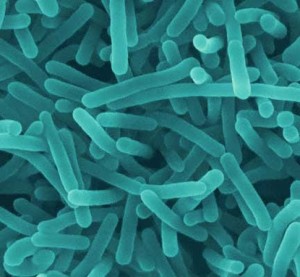New nanotechnology developed by University of Guelph researchers that stops pathogenic bacteria from doing their happy dance might help improve food safety.
 In an article published this week in the Royal Society of Chemistry’s Lab on a Chip Journal, the team describes nanotechnology used to study how food preservatives such as vinegar can control individual cells of Listeria monocytogenes.
In an article published this week in the Royal Society of Chemistry’s Lab on a Chip Journal, the team describes nanotechnology used to study how food preservatives such as vinegar can control individual cells of Listeria monocytogenes.
In 2008, this bug killed 23 people after contaminating meat-processing equipment at Canadian-based Maple Leaf Foods.
Besides lead author Evan Wright, third-year biological engineering, the team consisted of Guelph engineering professor Suresh Neethirajan; Prof. Keith Warriner, Department of Food Science; and Scott Retterer and Bernadetta Srijanto, Oak Ridge National Laboratory in Tennessee.
In Neethirajan’s bio-nano lab, the researchers developed a nano-porous microfluidic device to see how individual Listeria cells respond to acetic acid (vinegar).
This technology is much more precise than traditional methods of measuring how preservatives affect microbes.
Adding more vinegar slowed the bacteria and made them move more randomly and with less end-over-end tumbling – what Neethirajan calls “dancing.” Those changes indicate stress, meaning that the bacteria are less able to make biofilms and become less infective.
“We know exactly at what moment the bacterial change in motility occurs in relationship to the change in concentration,” said Neethirajan.
Listeria can grow over a wide range of temperatures and withstand many stresses.
“This is a powerful technology with strong potential,” said Warriner, a microbiologist who has studied bacterial food outbreaks. “It’s a method of testing the mode of action of preservatives in food systems.”
He said this study can also help in looking at how antibiotic resistance develops in pathogens such as Salmonella, and how Listeria and other pathogens invade tissue to cause illness. He said food companies might use their work to improve food packaging and storage to inhibit bacterial growth.
Along with Maple Leaf Foods, the Guelph researchers are using the technology to study resistance to cleaners for food preparation surfaces.
Adam Vogt, a master’s student with Neethirajan, uses the model to study Helicobacter pylori, which is associated with stomach ulcers and spicy food.
